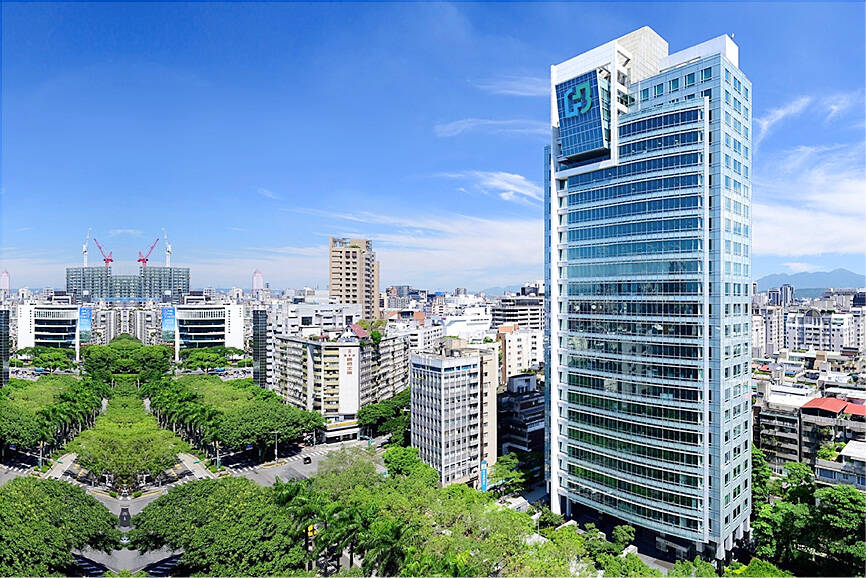Financial conglomerate Fubon Group (富邦集團) was the largest business group in Taiwan last year in terms of total assets, retaining the top spot on an annual local corporate list, Taipei-based credit information company CRIF (中華徵信所) said on Tuesday last week.
In its report on Taiwan’s top 100 business groups based on assets, CRIF said the group, which owns Fubon Financial Holding Co (富邦金控), had NT$12.24 trillion (US$393.37 billion) in total assets last year.
That was up 9.88 percent from a year earlier, as its life and non-life insurance units and securities business, as well as its banking operations in Hong Kong and China continued to grow, CRIF said.

Photo courtesy of Fubon Financial Holding Co
In 2020, Fubon replaced Lin Yuan Group (霖園集團) to become the largest financial group in the country for the first time, and saw its total assets grow to a record high last year, it said.
Lin Yuan, which owns Cathay Financial Holding Co (國泰金控), had NT$11.68 billion in total assets, taking the No. 2 spot, ahead of financial conglomerate CTBC Group (中國信託集團) with NT$7.13 billion; Taiwan Financial Holding Co (臺灣金融控股) with NT$5.99 trillion; Ruentex Group (潤泰集團), which owns insurance and property businesses, with NT$5.66 trillion; and Shin Kong Group (新光集團), which has financial, textile and property development operations, with NT$5.09 trillion, CRIF said.
Hon Hai Technology Group (鴻海科技集團), the world’s largest contract electronics maker, took seventh place with NT$5.07 trillion in total assets, followed by Taiwan Cooperative Financial Holding Co (合庫金控) with NT$4.43 trillion, Mega Financial Holding Co (兆豐金控) with NT$4.17 trillion and Formosa Plastics Group (FPG, 台塑集團) with NT$3.94 trillion, it said.
FPG, which owns flagship entity Formosa Plastics Corp (台塑), reported a 24.48 percent year-on-year increase in total assets last year, moving up two spots from 2020 to return to the top 10, as the COVID-19 pandemic and China’s “zero COVID” policy pushed up petrochemical product prices sharply.
The top 100 business groups in Taiwan reported NT$131.91 trillion in total assets last year, a record high, after rising 10.05 percent from a year earlier, CRIF said, adding that the 100 groups posted a 17.56 percent year-on-year rebound in sales, reversing a slight fall during the previous two years.
Hon Hai, also known as Foxconn Technology Group (富士康科技集團) internationally, generated NT$7.2 trillion in sales last year, up 10.62 percent from a year earlier on the back of solid demand for consumer electronics products and electronic components, CRIF said, adding that it was the first time the group had recorded revenue above NT$7 trillion.
It was the 14th consecutive year that Hon Hai had finished at the top of the sales rankings, it added.
FPG placed second after generating NT$2.27 trillion in revenue last year, ahead of electronics supplier and distributor Mitac-Sysnnex Group (聯華神通集團) with NT$1.92 trillion; Taiwan Semiconductor Manufacturing Co (TSMC, 台積電), the world’s largest contract chipmaker, with NT$1.61 trillion; and contract electronics maker Kinpo-Compal Group (金仁寶集團) with NT$1.40 trillion.
TSMC was the most profitable company in Taiwan last year after raking in NT$598 billion in net profit, followed by FPG with NT$265 billion, shipping and airline conglomerate Evergreen Group (長榮集團) with NT$251 billion, Hon Hai with NT$181 billion and shipping service provider Yang Ming Group (陽明) with NT$165 million, CRIF said.

South Korea’s equity benchmark yesterday crossed a new milestone just a month after surpassing the once-unthinkable 5,000 mark as surging global memory demand powers the country’s biggest chipmakers. The KOSPI advanced as much as 2.6 percent to a record 6,123, with Samsung Electronics Co and SK Hynix Inc each gaining more than 2 percent. With the benchmark now up 45 percent this year, South Korea’s stock market capitalization has also moved past France’s, following last month’s overtaking of Germany’s. Long overlooked by foreign funds, despite being undervalued, South Korean stocks have now emerged as clear winners in the global market. The so-called “artificial intelligence

NEW IDENTITY: Known for its software, India has expanded into hardware, with its semiconductor industry growing from US$38bn in 2023 to US$45bn to US$50bn India on Saturday inaugurated its first semiconductor assembly and test facility, a milestone in the government’s push to reduce dependence on foreign chipmakers and stake a claim in a sector dominated by China. Indian Prime Minister Narendra Modi opened US firm Micron Technology Inc’s semiconductor assembly, test and packaging unit in his home state of Gujarat, hailing the “dawn of a new era” for India’s technology ambitions. “When young Indians look back in the future, they will see this decade as the turning point in our tech future,” Modi told the event, which was broadcast on his YouTube channel. The plant would convert

‘SEISMIC SHIFT’: The researcher forecast there would be about 1.1 billion mobile shipments this year, down from 1.26 billion the prior year and erasing years of gains The global smartphone market is expected to contract 12.9 percent this year due to the unprecedented memorychip shortage, marking “a crisis like no other,” researcher International Data Corp (IDC) said. The new forecast, a dramatic revision down from earlier estimates, gives the latest accounting of the ongoing memory crunch that is affecting every corner of the electronics industry. The demand for advanced memory to power artificial intelligence (AI) tasks has drained global supply until well into next year and jeopardizes the business model of many smartphone makers. IDC forecast about 1.1 billion mobile shipments this year, down from 1.26 billion the prior

People stand in a Pokemon store in Tokyo on Thursday. One of the world highest-grossing franchises is celebrated its 30th anniversary yesterday.